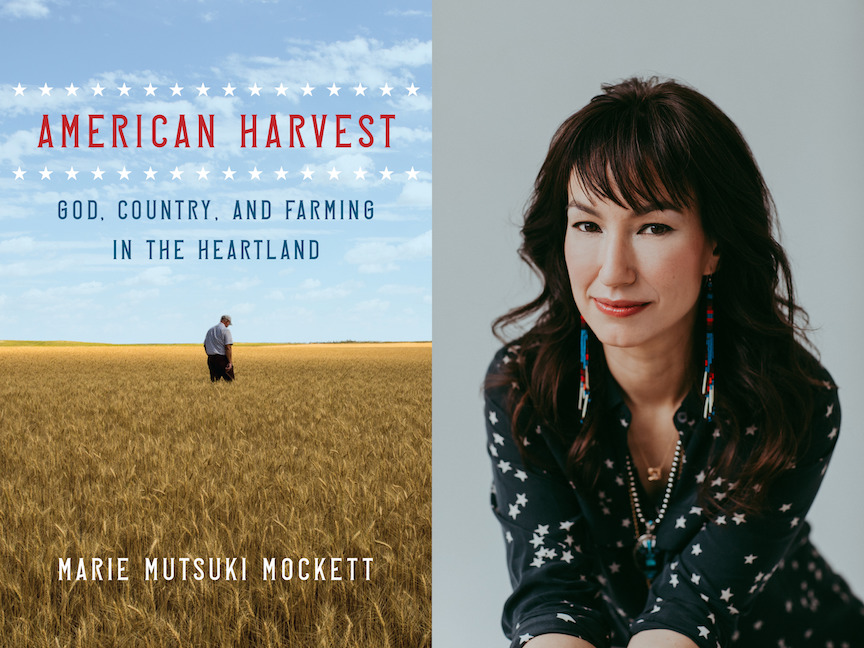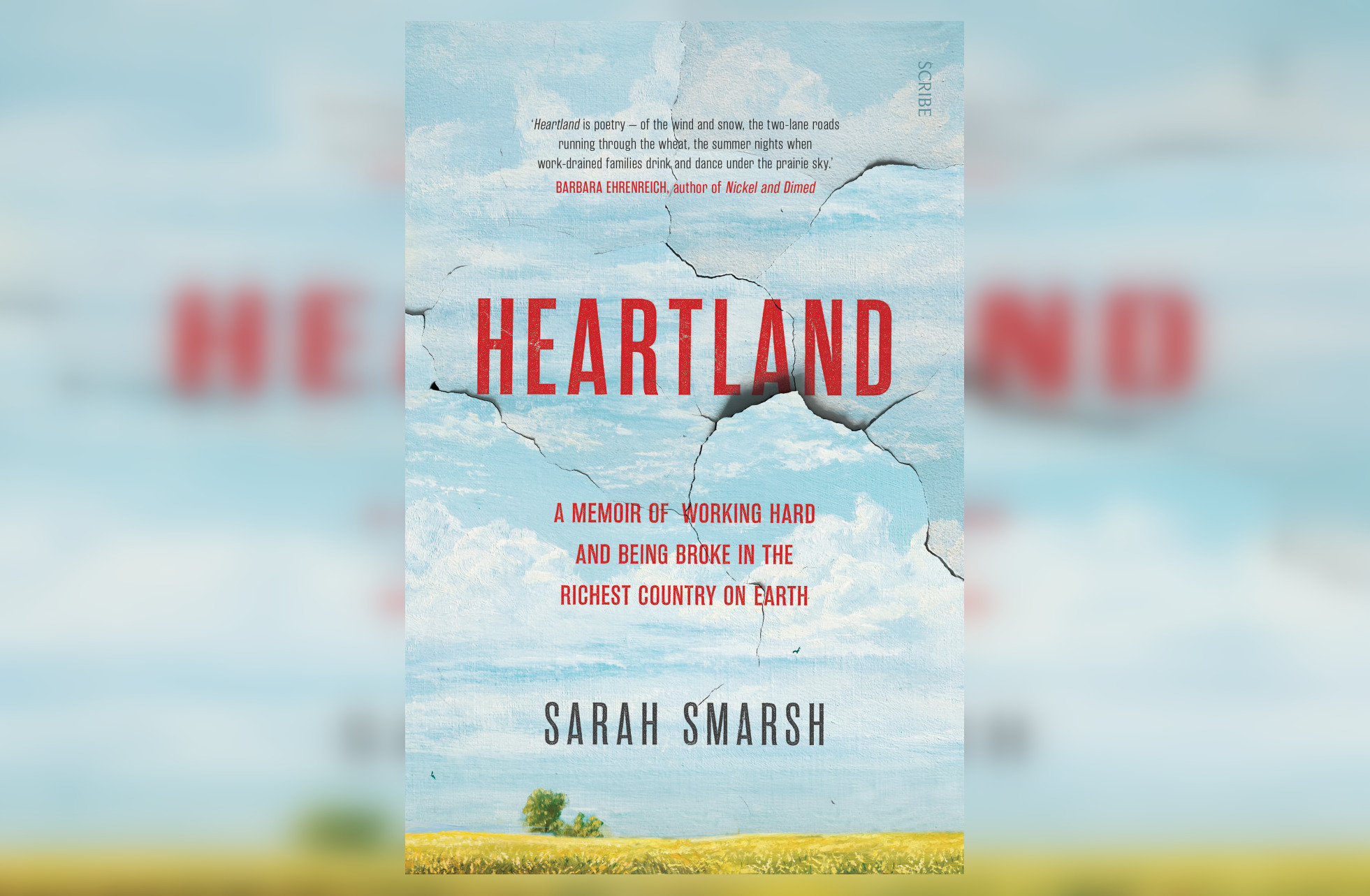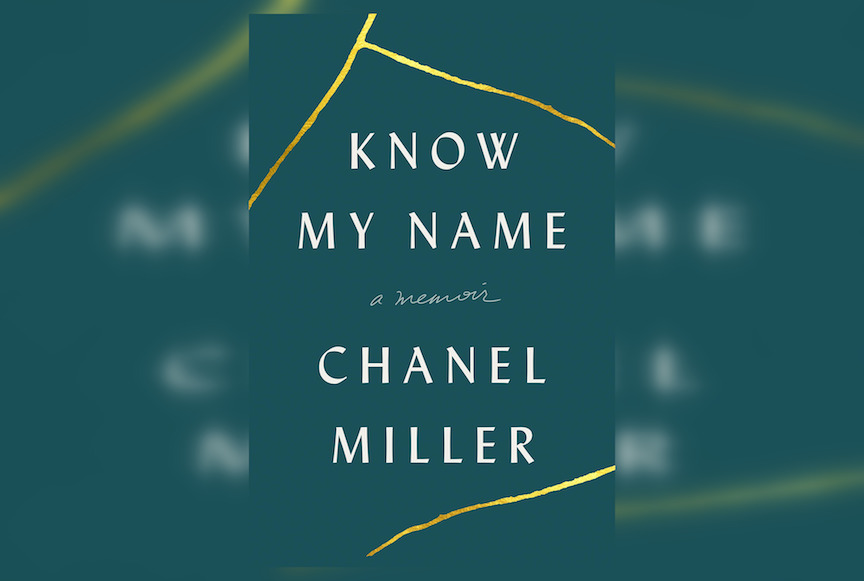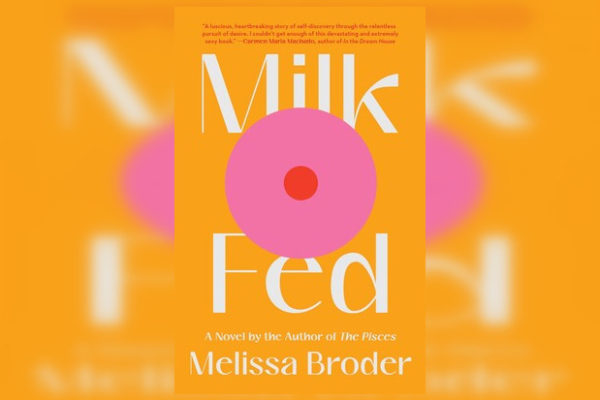Marie Mutsuki Mockett’s journey begins among the tumbleweeds of Texas and finishes with a crawl over the Rockies and a descent into the fertile Snake River Valley. Her new book, American Harvest: God, Country, and Farming in the Heartland, is an attempt to reconcile what she calls “the divide” between urbanites like herself and Americans living in the flyover states.
Mutsuki Mockett has written about her maternal Japanese heritage in both fiction and memoir, but American Harvest is her first nonfiction work exploring her paternal roots in rural Nebraska. During a Nebraska wheat harvest, Mutsuki Mockett and a few members of her family—an amalgamation of wheat farmer, scientist, artist, engineer, and writer—posed a question: “Why do her city-dwelling, atheist friends shop exclusively for GMO-free organic food, while the religious farmers of the Midwest are open to the benefits of GMO technology?”
For the urbanite, it is simply a question of food and science. But for an evangelical Christian farmer in the Midwest, questions about food and science lead to questions about God, creationism, and the Bible. This entanglement leaves atheist city dwellers, like Mutsuki Mockett, scratching their heads. She wants to be tolerant of those who believe in creationism, but at the same time, she questions their intellect. Likewise, farmers don’t understand the urbanite obsession with organic and non-GMO products. If Whole Foods shoppers really understood the science of soil, seeds, and agricultural management, they wouldn’t fall for slick marketing and labels on organic foods. Ignorance and misunderstanding send each side to their respectives corners.
Eric Wolgemuth, a long-time friend of the Mockett family, took interest in their question. He invited Mutsuki Mockett to join his harvesting crew for a five-month-long trek across the Midwest. Wolgemuth, a devout Christian, is her guide through the physical rigors of harvesting wheat and the religious landscape of the American heartland. Often, Mutsuki Mockett feels like a foreigner in her own country. Wolgemuth’s college-age son, Juston, becomes Mutsuki Mockett’s cultural interpreter. Their respectful dialogue about religion and cultural prejudice gives her hope that “the divide” can be spanned through empathy and compromise.
Mutsuki Mockett discovers that her question, like a million years of sediment, and centuries of Midwest history, is more complicated than she first anticipated. Every part of her question requires historical context: To understand GMO’s, we have to understand Monsanto, and agricultural technology, irrigation, and soil. To understand the people with whom she travels, Mutsuki Mokett needs a basic understanding of evangelical Christiantiy and its history in the Midwest. She’s cautious about the pitfalls of a history-laden book, but defends leaning into historical content: “It’s important to know the truth, and that’s what an examination of history can give us.”
The book maintains a robust pace, alternating between researched material and her journey with the harvesters. While the antsy crew waits for thunderstorms to pass so that they can begin cutting, Mutsuki Mockett visits small-town museums and Indian graveyards—placeholders for the pain of lost communities. Each Midwest town she visits has hectares of wheat and centuries of history to harvest. Stories of the crew satisfy our hunger for narrative, and history provides context for their lived experience.
Six days of the week, Mutsuki Mockett works and plays alongside the crew. They cut wheat, repair combines, hunt wild pigs, and attend rodeos and monster truck events. She also studies seeds and soil. She learns that all wheat is not golden—it’s also red, and bright yellow, and white. She moves through a lush Oklahoma wheatfield, “so thick, I have to move slowly, as if I’m walking through stiff whipped cream,” and appreciates the Oklahoma dirt, “so red and soft and fertile. It’s as if flesh itself is bleeding to give us wheat.” Her descriptions are graceful and reverential.
On the seventh day of each week Mutsuki Mockett goes to church: cowboy church, mega church, house church, Mennonite church, and LDS church. The people she meets rarely express doubt about their faith in Jesus Christ and the Bible, but their interpretations of God’s word are as varied as the soil they cultivate. Through it all, Mutsuki Mockett, a non-believer, remains open-minded and curious. She wonders if a person can have a change of heart, and what that might require. She wonders how Christians can believe in Adam and Eve. She wonders if fitting in with the harvesters means she must not “present myself as a shrill, city-dwelling and evolution-believing person.” Some of the pastors frighten and anger her, some make her weep. On Sundays, Mutsuki Mockett discovers that her original GMO question isn’t only about fertilizers, herbicide, and scientific progress; within the big question are subtle gradations about our basic human desires to be seen, understood, respected, trusted, and accepted.
Mutsuki Mockett hopes to find answers in Juston, her twenty-something Mennonite interpreter of all things Midwest and Christian. She credits his college education for the “correction,” of his own spiritual journey. She says, “I thought Juston would be like a terrarium: I would be on the outside watching God waddle around inside of him and, thus, observed, God would make some sense to me at last. But this is apparently not what God had in mind. God had in mind that a conservative Christian would question whether God even exists, and then decide to talk to me about it and try to determine what, if anything, is real, and I would go into the terrarium and be asked to waddle around too.” If walking with short steps and a clumsy, swaying motion is the best we can do, then Mutsuki Mockett invites us to waddle with her. American Harvest is 381 pages long, plenty of time and space to bump up against each other, knocking away (or at least, smoothing down) our sharp corners of cultural misunderstanding.




